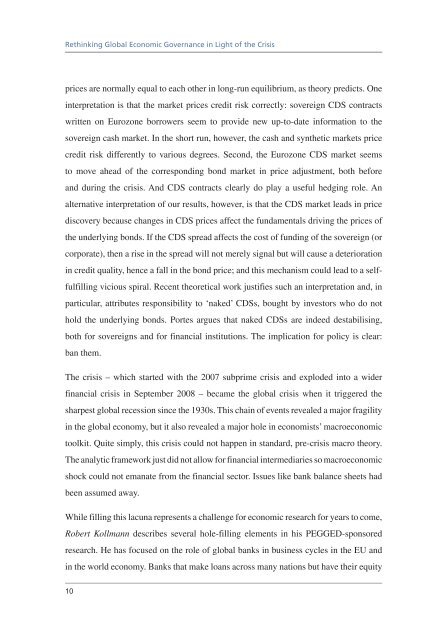Download PDF - Vox
Download PDF - Vox
Download PDF - Vox
- No tags were found...
You also want an ePaper? Increase the reach of your titles
YUMPU automatically turns print PDFs into web optimized ePapers that Google loves.
Rethinking Global Economic Governance in Light of the Crisisprices are normally equal to each other in long-run equilibrium, as theory predicts. Oneinterpretation is that the market prices credit risk correctly: sovereign CDS contractswritten on Eurozone borrowers seem to provide new up-to-date information to thesovereign cash market. In the short run, however, the cash and synthetic markets pricecredit risk differently to various degrees. Second, the Eurozone CDS market seemsto move ahead of the corresponding bond market in price adjustment, both beforeand during the crisis. And CDS contracts clearly do play a useful hedging role. Analternative interpretation of our results, however, is that the CDS market leads in pricediscovery because changes in CDS prices affect the fundamentals driving the prices ofthe underlying bonds. If the CDS spread affects the cost of funding of the sovereign (orcorporate), then a rise in the spread will not merely signal but will cause a deteriorationin credit quality, hence a fall in the bond price; and this mechanism could lead to a selffulfillingvicious spiral. Recent theoretical work justifies such an interpretation and, inparticular, attributes responsibility to ‘naked’ CDSs, bought by investors who do nothold the underlying bonds. Portes argues that naked CDSs are indeed destabilising,both for sovereigns and for financial institutions. The implication for policy is clear:ban them.The crisis – which started with the 2007 subprime crisis and exploded into a widerfinancial crisis in September 2008 – became the global crisis when it triggered thesharpest global recession since the 1930s. This chain of events revealed a major fragilityin the global economy, but it also revealed a major hole in economists’ macroeconomictoolkit. Quite simply, this crisis could not happen in standard, pre-crisis macro theory.The analytic framework just did not allow for financial intermediaries so macroeconomicshock could not emanate from the financial sector. Issues like bank balance sheets hadbeen assumed away.While filling this lacuna represents a challenge for economic research for years to come,Robert Kollmann describes several hole-filling elements in his PEGGED-sponsoredresearch. He has focused on the role of global banks in business cycles in the EU andin the world economy. Banks that make loans across many nations but have their equity10














